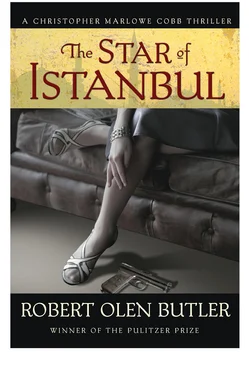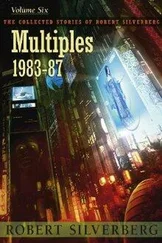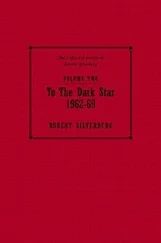“Not tonight?”
“Not tonight.”
“Good,” she said. “Thank you.”
She closed the door before I could reply.
I stood there for a while thinking what to do.
I had a hunch about her. The things still withheld from me might send her from this room.
I moved away.
I installed myself at a table in a corner of the Kubbeli Salon, my back to the wall, able to watch anyone emerge from the doors that led from the elevator and staircase. She would have to pass by me to leave the hotel, and unless she looked sharply over her right shoulder as soon as she entered the salon, she would never notice me.
I drank raki, a clear, fine Turkish brandy that reminded me in its clarity and burn of the aguardiente I’d come to like very much last year in Vera Cruz. I nursed a moderate sequence of raki all afternoon and into the early evening with an equally slow graze through a few orders of meze, small-portion plates, kashar cheese and mixed pickles and ripe melon and a paste of hot peppers with walnuts.
It was good to eat the local food, by turns hot and sharp and sour and sweet. The raki smoothed my mind and let me work at the challenges before me without an edge; though, to be honest, without the edge I could make no progress.
But I’d finished drinking before the evening and then I had a little more food and I was feeling good and collected and energized again and I’d been paying as I was served so as to be ready to leap up and follow Selene at once, but now I was beginning to think she wouldn’t appear.
And then a figure in black floated before me, across the parquet floor, and I was the only one in Istanbul who could recognize her, because nothing of her showed. I’d seen the dress before and it fit her pretty close, but not an inch of flesh was visible, her hands in black gloves, her face shrouded in a black veil. This was the movie star burqa . But I knew who was inside.
I rose and I followed.
She went out the main doors and spoke to one of the brass-buttoned, pigeon-plumed boys, who led her to a taxi at the hotel’s stand. I slipped past her as she was getting in and I got into the next taxi. I unsuccessfully rushed through English and German with the driver and found a mutual French just in time to have him follow.
We briefly descended the hill toward the Bosporus and then turned into the street the locals called İstiklal Caddesi — Independence Avenue — but which was known within Pera itself as the Grand Rue de Péra.
The taxis rushed way too fast for all the people and horses and carts and we slowed only for an electric tram. This was a car on the same line that this morning had been carrying the Turkish wounded to the German hospital in Pera, at one end crowded with Turkish men in suits and fezes and at the other with men in suits and Alpines — no doubt Germans — whose company included Western women dolled up and showing their faces and arms. How breathless with desire were those Turks on the tram, I wondered, at the public sight of these usually hidden female parts. And my driver drove more with his horn than his brake or his gearshift and I supposed Selene’s taxi ahead was doing likewise.
We soon arrived near a brightly lit café and a darkened Bon Marché. I paid and delayed in my taxi and watched through the front window as Selene emerged.
I opened my taxi door and stepped out as she hurried directly across the sidewalk and disappeared beneath the arch of a marble building-front. I followed.
The Turks among the crowd of Western swells bumped past me in my crossing. The fezes never seemed to stop their forward hurtle in a crowded Istanbul street. A dance band was playing somewhere along the way. I passed through the arch, with two towering concrete Nubian maidens in diaphanous gowns posed at each side of the pier. A corridor led deep inside, bright with electric lights and lined with poster portraits of Chaplin and Fairbanks and Pickford and Gish.
I stopped beside the portrait of Bourgani, as Bourgani herself stopped a dozen yards ahead to buy a ticket from the cashier in a marble kiosk. She was in profile to me, though she had not lifted her veil. Beyond her were heavy swinging glass doors and above them, in thick, loopy, all-capitaled Art Nouveau style, looking like a stop on the Paris Metro, was the name of this place: cinéma de pera.
I was reconciled to her seeing me, but she did not look in my direction. She turned from the kiosk and moved toward the doors and I stepped forward and quickly bought a ticket.
Through those doors, the space opened up widely to the left and right, shaping an outer lobby. Along it were four archways opening to the auditorium’s aisles: two at the far sides and two defining a large center section and two smaller side sections. I did not see Selene. I chose the left-center arch and stepped in and pulled up instantly. She was standing just a couple of paces before me, in the middle of the aisle, absolutely still.
The place was dim but I could clearly see its froufrou, its gilded cherubs and its rolling terra-cotta flowering vines and its theatrical masks as gaudy as any Belasco house on Broadway. The forward rows were mostly full; the high screen before us was not yet lit. From somewhere in the middle of the auditorium men’s voices surged — in German — and broke into laughter. Perhaps they were some of the boys from the Pera Palace.
I took all this in but I kept Selene in the edge of my sight, and now I looked at her again. The back few rows were less populated, and just before her, the aisle seat in the left-hand section was empty. She took a step forward and sat in it. I sat on the aisle in the center section, one row behind her.
The house lights dimmed further and went out.
I realized I had not looked at the final poster, which announced tonight’s film. Perhaps Selene hadn’t either. I had a feeling she was here no matter what was playing. This was her house.
The screen lit up white and the clatter of the film projector began from above and behind us, and that soon faded with the sound of an accompanying piano — a strong, well-tuned piano — a grand, up front in the shadows beneath the screen.
The short subjects had already been played. The feature began and the first title card came up:
Max Reinhardt Präsentiert
DER LILIM
Selene’s German movie.
And the next title:
Regie
Kurt Fehrenbach
I looked in her direction.
She was lifting her veil.
The light from the screen fell softly upon her face. I was a little behind her, but to see the screen she was looking across the center section of seats. She was almost in profile to me. She could see nothing of me — her angle put me just behind her periphery — but I had enough of her face in this darkened space for it to prickle my skin.
I looked back to the screen, even as the cinematographer credit— Photographie— faded away and the cast list came up, character and actor. Personen. And the star of this movie was at the top of the list, her name writ large:
Lilith Weiss. . . SELENE BOURGANI.
The second lead was somewhat smaller, Martin Beckenbach played by Emil Jannings. I did not read the list further. I looked again at Selene.
Her face was lifted slightly. The light flickered there but her face did not change for a long few moments, and then it did. Her eyes closed and I looked and she was there before us both, Selene Bourgani the film actress.
She was leaning against a bar in a nightclub and she was lit bright in the middle of dim bodies drinking and dancing and embracing all around her and the shadows were dark and sharp-edged and her splay of hair was a wild dark shadow of its own. We saw her face in close-up and her dark eyes were enormous — Selene’s eyes seemed always to be the blackest thing on the screen — and she was burning. And we saw the object of her fire: a young man dancing with a woman across the room. But not dancing with the crazed self-absorption of all the other dancers. This couple was dancing with their eyes fixed on each other. This was a couple in love.
Читать дальше












